|
|
|
Sort Order |
|
|
|
Items / Page
|
|
|
|
|
|
|
| Srl | Item |
| 1 |
ID:
105713
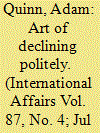

|
|
|
|
|
| Publication |
2011.
|
| Summary/Abstract |
Predictions of 'American decline' have come and gone before, apparently in cycles, leading some to regard it as a cultural trope stemming from domestic insecurities rather than a serious prospect. There is reason to believe, however, that this time is different. Fundamental erosion of the United States' decades-long primacy may finally be at hand, and wise analysis should resist the temptations of contrarianism or denial. Critics of 'declinism' have offered important caveats with which we should qualify any overly simplistic or deterministic portrait of America's trajectory from hegemon to lesser status. This article gives such qualifications due weight while nevertheless seeking to steer our gaze back towards the core truth at the heart of the declinist thesis. That is: unless something very significant changes to jolt the course of events onto a different track, the relative power of the United States-measured in terms of its advantage over others in economic and military capacity-will be shrinking significantly over the decades to come. Happily, the nation's current president seems to have a disposition well fitted to leading the nation into the opening stages of an era of relative decline. President Obama has made headlines in recent months for his boldness in orchestrating the killing of Osama bin Laden. A fuller survey of his foreign policy, however, reveals that its most signal feature has been prudence and circumspection regarding American power and its exercise. Major divergence between the ends pursued and the capacities available for their pursuit is one of the cardinal sins giving rise to strategic failure. It is thus fortunate for the United States that it should have a president who, even if he may not be inclined to cast it in such words himself, seems disposed not to 'rage against the dying of the light' of American primacy, but to practice the admirable art of declining politely.
|
|
|
|
|
|
|
|
|
|
|
|
|
|
|
|
| 2 |
ID:
105716
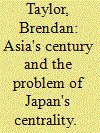

|
|
|
|
|
| Publication |
2011.
|
| Summary/Abstract |
Japan has long been regarded as a central component of America's grand strategy in Asia. Scholars and practitioners assume this situation will persist in the face of China's rise and, indeed, that a more 'normal' Japan can and should take on an increasingly central role in US-led strategies to manage this power transition. This article challenges those assumptions by arguing that they are, paradoxically, being made at a time when Japan's economic and strategic weight in Asian security is gradually diminishing. The article documents Japan's economic and demographic challenges and their strategic ramifications. It considers what role Japan might play in an evolving security order where China and the US emerge as Asia's two dominant powers by a significant margin. Whether the US-China relationship is ultimately one of strategic competition or accommodation, it is argued that Japan's continued centrality in America's Asian grand strategy threatens to become increasingly problematic. It is posited that the best hope for circumventing this problem and its potentially destabilizing consequences lies in the nurturing of a nascent 'shadow condominium' comprising the US and China, with Japan as a 'marginal weight' on the US side of that arrangement.
|
|
|
|
|
|
|
|
|
|
|
|
|
|
|
|
| 3 |
ID:
105715
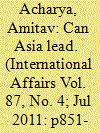

|
|
|
|
|
| Publication |
2011.
|
| Summary/Abstract |
Is the much hyped 'rise of Asia' translating into global public good? The leading Asian powers, China, India and Japan, demand a greater share of the decision-making and leadership of global institutions. Yet, they seem to have been more preoccupied with enhancing their national power and status than contributing to global governance, including the management of global challenges. This is partly explained by a realpolitik outlook and ideology, and the legacies of India's and China's historical identification with the 'Third World' bloc. Another key factor is the continuing regional legitimacy deficit of the Asian powers. This article suggests that the Asian powers should increase their participation in and contribution to regional cooperation as a stepping stone to a more meaningful contribution to global governance
|
|
|
|
|
|
|
|
|
|
|
|
|
|
|
|
| 4 |
ID:
105722
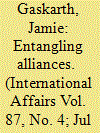

|
|
|
|
|
| Publication |
2011.
|
| Summary/Abstract |
The global war on terrorism gives rise to a range of legal, political and ethical problems. One major concern for UK policy-makers is the extent to which the government may be held responsible for the illegal and/or unethical behaviour of allies in intelligence gathering-the subject of the forthcoming Gibson inquiry. The UK government has been criticized by NGOs, parliamentary committees and the media for cooperating with states that are alleged to use cruel, inhuman and degrading treatment (CIDT) or torture to gain information about possible terrorist threats. Many commentators argue that the UK's intelligence sharing arrangements leave it open to charges of complicity with such behaviour. Some even suggest the UK should refuse to share intelligence with countries that torture. This article refutes this latter view by exploring the legal understanding of complicity in the common law system and comparing its more limited view of responsibility-especially the 'merchant's defence'-with the wider definition implied in political commentary. The legal view, it is argued, offers a more practical guide for policy-makers seeking to discourage torture while still protecting their citizens from terrorist threats. It also provides a fuller framework for assessing the complicity of policy-makers and officials. Legal commentary considers complicity in relation to five key points: identifying blame; weighing the contribution made; evaluating the level of intent; establishing knowledge; or, where the latter is uncertain, positing recklessness. Using this schema, the article indicates ways in which the UK has arguably been complicit in torture, or at least CIDT, based on the information publicly available. However, it concludes that the UK was justified in maintaining intelligence cooperation with transgressing states due to the overriding public interest in preventing terrorist attacks.
|
|
|
|
|
|
|
|
|
|
|
|
|
|
|
|
| 5 |
ID:
105711
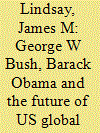

|
|
|
|
|
| Publication |
2011.
|
| Summary/Abstract |
The foreign policy world views of George W. Bush and Barack Obama differ dramatically. Bush made terrorism the focal point of his foreign policy and dismissed the idea that either allies or international institutions should constrain America's freedom of action. Obama sees terrorism as one of many transnational problems that require the cooperation of other countries to combat and, as a result, the United States must invest more in diplomatic efforts to build partnerships. Despite these differences, both presidents share one common conviction: that other countries long for US leadership. Bush believed that friends and allies would eventually rally to the side of the United States, even if they bristled at its actions, because they shared America's goals and had faith in its motives. Obama believed that a United States that listened more to others, stressed common interests and favored multinational action would command followers. In practice, however, both visions of American global leadership faltered. Bush discovered that many countries rejected his style of leadership as well as his strategies. Obama discovered that in a globalized world, where power has been more widely dispersed, many countries are not looking to Washington for direction. The future success of US foreign policy depends on the ability of policy-makers to recognize and adapt to a changing geopolitical environment in which the US remains the most significant military, diplomatic and economic power but finds it, nonetheless, increasingly difficult to drive the global agenda.
|
|
|
|
|
|
|
|
|
|
|
|
|
|
|
|
| 6 |
ID:
105719
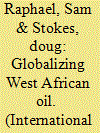

|
|
|
|
|
| Publication |
2011.
|
| Summary/Abstract |
This article examines the nature of US oil intervention in West Africa and in particular the ways in which US strategic policy is increasingly being wedded to energy security. It argues that academic debates of a 'new oil imperialism' overplays the geostrategic dimensions of US policy, which in turn underplays the forms of globalization promoted by Washington in the postwar world. Specifically, the US has long sought to 'transnationalize' economies in the developing world, rather than pursue a more mercantilist form of economic nationalism. This article argues that US oil intervention in Africa conforms to this broader picture, whereby processes of transnationalization and interstate competition are being played out against the backdrop of African oil. The recent turmoil in the Middle East and North Africa will add to these dynamics in interesting and unpredictable ways.
|
|
|
|
|
|
|
|
|
|
|
|
|
|
|
|
| 7 |
ID:
105717
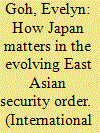

|
|
|
|
|
| Publication |
2011.
|
| Summary/Abstract |
This article argues that Japan matters crucially in the evolving East Asian security order because it is embedded both in the structural transition and the ongoing regional strategies to manage it. The post-Cold War East Asian order transition centres on the disintegration of the post-Second World War Great Power bargain that saw Japan subjecting itself to extraordinary strategic constraint under the US alliance, leaving the conundrum of how to negotiate a new bargain that would keep the peace between Japan and China. To manage the uncertainties of this transition, East Asian states have adopted a three-pronged strategy of: maintaining US military preponderance; socializing China as a responsible regional great power; and cultivating regionalism as the basis for a long-term East Asian security community. Japan provides essential public goods for each of these three elements: it keeps the US anchored in East Asia with its security treaty; it is the one major regional power that can and has helped to constrain the potential excesses of growing Chinese power while at the same time crucially engaging with and helping to socialize China; and its economic and political participation is critical for meaningful regionalism and regional integration. It does not need to be a fully fledged, 'normal' Great Power in order to carry out these roles. As the region tries to mediate the growing security dilemma among the three great powers, Japan's importance to regional security will only grow.
|
|
|
|
|
|
|
|
|
|
|
|
|
|
|
|
| 8 |
ID:
105721
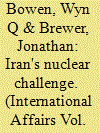

|
|
|
|
|
| Publication |
2011.
|
| Summary/Abstract |
The technical and political evidence that Iran is seeking to establish a 'nuclear hedging' capability has gradually increased over the past nine years. The regime in Tehran has continued to insist that its nuclear ambitions are purely civilian in nature and it has resisted the international community's dual-track policy, encompassing both negotiations and sanctions, to persuade Iran to be fully transparent about its nuclear activities and plans, and to suspend work related to uranium enrichment and plutonium separation. While the prospects for a negotiated solution currently appear slim, the regime does not yet appear to have decided whether, or when, to produce nuclear weapons and to break out of the Nuclear Non-Proliferation Treaty. It is essential, therefore, to maintain and if necessary to build up the pressure on Iran and to strengthen efforts to disrupt its procurement of technology and materials for its nuclear programme. It is also imperative for the international community to maintain negotiations and also consider alternative diplomatic approaches to enhance the prospects of keeping Iran focused purely on civil nuclear ambitions, while at the same time resolving questions related to the possible military dimensions of Iran's nuclear programme.
|
|
|
|
|
|
|
|
|
|
|
|
|
|
|
|
| 9 |
ID:
105714
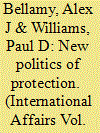

|
|
|
|
|
| Publication |
2011.
|
| Summary/Abstract |
In March 2011, the UN Security Council authorized the use of force to protect civilians in Libya. This was the first time that the Council has ever authorized the invasion of a functioning state for such purposes. International society's relatively decisive responses to recent crises in Côte d'Ivoire and Libya has provoked significant commentary, suggesting that something has changed about the way the world responds to violence against civilians. Focusing on these two cases, this article examines the changing practice of the UN Security Council. It argues that we are seeing the emergence of a new politics of protection, but that this new politics has been developing over the past decade. Four things are new about this politics of protection: protecting civilians from harm has become a focus for international engagement; the UN Security Council has proved itself willing to authorize the use of force for protection purposes; regional organizations have begun to play the role of 'gatekeeper'; and major powers have exhibited a determination to work through the Security Council where possible. However, the cases of Côte d'Ivoire and Libya also help to highlight some key challenges that might halt or reverse progress. Notably, states differ in the way they interpret mandates; questions are being asked about the UN's authority to act independently of specific Security Council authorizations; the overlap of regional organizations sometimes sends conflicting messages to the Security Council; and there remains a range of difficult operational questions about how to implement protection mandates. With these in mind, this article concludes with some suggestions about how the future challenges might be navigated in order to maintain the progress that has been made in the past decade.
|
|
|
|
|
|
|
|
|
|
|
|
|
|
|
|
| 10 |
ID:
105712


|
|
|
|
|
| Publication |
2011.
|
| Summary/Abstract |
Ten years after the terrorist attacks on New York and Washington DC on September 11, 2001, the United States remains embroiled in a long-term struggle with what George W. Bush termed the existential threat of international terrorism. On the campaign trail, his successor as US President, Barack Obama, promised to reboot the 'war on terror'. He claimed that his new administration would step back from the rhetoric and much of the Bush administration policy, conducting a counterterrorism campaign that would be more morally acceptable, more focused and more effective-smarter, better, nimbler, stronger. This article demonstrates, however, that those expecting wholesale changes to US counterterrorism policy misread Obama's intentions. It argues that Obama always intended to deepen Bush's commitment to counterterrorism while at the same time ending the 'distraction' of the Iraq War. Rather than being trapped by Bush's institutionalized construction of a global war on terror, the continuities in counterterrorism can be explained by Obama's shared conception of the imperative of reducing the terrorist threat to the US. The article assesses whether Obama has pursued a more effective counterterrorism policy than his predecessor and explores how his rhetoric has been reconstituted as the actions of his policy have unfolded. By addressing his policies toward Afghanistan and Pakistan, Guantánamo Bay and torture, the uses of unmanned drone attacks and domestic wire-tapping, this article argues that Obama's 'war' against terrorism is not only in keeping with the assumptions and priorities of the last ten years but also that it is just as problematic as that of his predecessor.
|
|
|
|
|
|
|
|
|
|
|
|
|
|
|
|
|
|
|
|
|